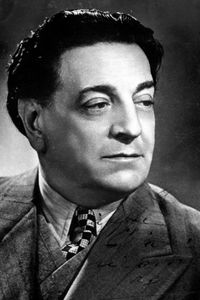Raffaele Attilio Amedeo Schipa, a renowned Italian tenor, was professionally known as Tito Schipa, and is widely regarded as the greatest tenore di grazia, a title reserved for the most skilled and refined vocalists.
December 27, 1888, marked the arrival of a future opera legend, Schipa, in the charming city of Lecce, Apulia, Italy, where he was born to a family of Arbëreshë descent. However, due to a discrepancy in record-keeping, Schipa's official birthdate would later be amended to January 2, 1889, for purposes of military conscription.
He embarked on his academic journey in Milan, laying the foundation for a successful career in opera. After honing his craft, Schipa made his operatic debut at the tender age of 21 in 1910 at Vercelli.
Noted Italian tenor, Schipa, embarked upon a illustrious career, characterized by a plethora of performances across Italy and in Buenos Aires, Argentina, during the early stages of his professional journey.
It was in the year 1917 that Schipa created the iconic role of Ruggiero in Puccini's esteemed opera, La rondine, a milestone that not only showcased his remarkable vocal abilities but also marked a significant turning point in his artistic development.
Throughout his career, Schipa continued to hone his craft, performing in numerous productions throughout Italy and abroad, his reputation as a masterful tenor spreading far and wide.
In 1919, Schipa joined the esteemed Chicago Opera Company, a prestigious institution that would serve as his artistic home for the next thirteen years, from 1919 to 1932, during which time he would have the opportunity to perform alongside some of the world's most renowned musicians and singers.
Noted Italian opera singer, Schipa, embarked on a illustrious career in 1932, making his debut at the prestigious New York Metropolitan Opera, where he would go on to perform consistently until 1935, only to return again in 1941.
Simultaneously, Schipa's repertoire expanded to include performances at the esteemed San Francisco Opera, commencing in 1924. This marked the beginning of a long-standing association with the opera house.
Over the course of the following two decades, from 1929 to 1949, Schipa's artistic talents took him on a journey throughout Italy, with regular performances at some of the country's most renowned opera houses, including the iconic La Scala, Milan, and the Rome Opera.
Noted Italian opera singer, Schipa, made a triumphant return to Buenos Aires in 1954, captivating audiences with his powerful vocals, marking a significant milestone in his illustrious career.
In 1957, he embarked on a tour of the Soviet Union, further solidifying his reputation as a master of his craft.
Moreover, Schipa's artistry has been preserved for posterity through the medium of film, with one notable example being his appearance in a Vitaphone movie short from 1929.
In this early cinematic endeavor, he sang the iconic aria "M'appari tutt'amor" from Flotow's beloved opera Martha, leaving a lasting impression on all who witnessed his performance.
Tullio Sipia's illustrious career was marked by a remarkable reduction in the breadth of his stage repertoire, ultimately comprising approximately twenty endearing Italian and French operatic roles that showcased his exceptional vocal range and mastery. These roles, carefully curated to highlight his unique talents, included iconic productions such as Massenet's poignant portrayal of Werther, Donizetti's charming L'elisir d'amore, and Cilea's captivating L'arlesiana.















